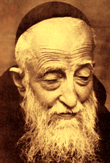Ave Maria Meditations
St. Leopoldo Mandic is known as an Apostle of the Confessional and also as an Apostle of Unity. Feast Day is July 30th.

SAINT OF THE CONFESSIONAL
To be a good confessor one must first of all gain the confidence of the penitent. In this Fr. Leopoldo succeeded wonderfully. His very person, so small as to be scarcely visible in the semi-darkness of cell, his features calm and radiating kindness, his eyes full of serenity, his measured and paternal gestures, all combined to awake confidence from all who approached. Often he would get up and go to meet the penitent as if he were greeting an old and expected friend.
Nothing he did or said could in any way humiliate the visitor and cause him to close his heart. He paid attention to everything, knowing that confidence is built on a variety of imponderables which may often appear insignificant. So much skill and so much virtue naturally disposed the penitent to listen with a receptive mind to the instruction and exhortations which followed. What he said was not just a routine affair, the same for everyone; he said what was needed by each individual soul in a manner easily understood by the person in question, using dialect and popular phrases if they would help. This was a point he considered very important.
“In the confessional,” he told a fellow-priest one day, we must not put on a show of culture or talk over the head of the penitent of the moment or we shall only succeed in spoiling the work of God that is in progress in him. It is God Who does the work: we should remain in the background, confining ourselves to assisting this divine intervention in the mysterious ways of salvation and sanctification.”
An outstanding characteristic of Fr. Leopoldo’s work was the almost miraculous way he followed up his penitents, He felt them almost a part of himself. He prayed for them and awaited their return and when saying good-bye to a newcomer, he always added, “Come back again, I shall be expecting you.” Fr. Leopoldo really did love his penitents.
(information from “Fr. Leopoldo of Castelnovo” by Fr. Pietro da Valdiporro)

LOVE FOR THE EUCHARIST
Father Leopoldo spent most of his life as a Capuchin Franciscan in Padua, Italy. He had a very great love for the Holy Mass and aware that the Holy Eucharist is the inexhaustible source of all good, and moved by charity, he did everything in his power to persuade others to approach the Blessed Sacrament.
AN EXTRAORDINARY LOVE FOR MARY, THE BLESSED MOTHER.
Always an ardent student of Mariology (the study of Mary’s role in Christ’s Redemption of man, Padre Leopoldo wrote on a picture of the Blessed Virgin in 1927: “I. Fr. Leopoldo Mandie Zarevic. believe that the Blessed Virgin as Co-Redemptress of the human race is the moral cause of all grace everything we receive comes from her fullness. ” On one occasion he solemnly wrote: “The August Mother of God is in truth Co-Redemptress of the human race and source of all Grace. In fact, on the one hand we have in her the most perfect obedience to God’s laws and, after her Son, the most perfect innocence: He, impeccable by His nature, she, impeccable by Grace. On the other hand we see her as Our Lady of Sorrows, as He was the Man of Sorrows. If, therefore, by eternal decree of God, the Immaculate Virgin was the moral victim of sorrow as her Son was the physical victim, and if God’s avenging Justice found no shadow of fault in them, it follows: inevitably that they were paying the price of the sins of others, that is of mankind.”
Padre Leopoldo never hesitated to say: “I rely on the powerful intercession of Our Lady, on her mother’s heart, for everything. We have in heaven the heart of a mother, The Virgin, our Mother, who at the foot of the Cross suffered as much as possible for a human creature, understands our troubles and consoles us.”

He was born in Dalmatia (Bosnia-Hercogovina) in 1866. He was small and sickly and even when grown to manhood he was only 4’5″ tall and never enjoyed good health. His voice was weak and so it was decided that he would not make for a good preacher which was a terrible blow to him for he longed with all his heart to do all he could for the reunification of the Eastern Church with Rome and desired to preach to the Orthodox, especially in his homeland.
Instead he would offer the considerable sufferings of his life: he was later crippled with arthritis and died of a cancer, for the unity of the Church, east to west. God had other plans than preaching for this, His good servant. He died in 1942 and was canonized by Pope John Paul II in 1983.

